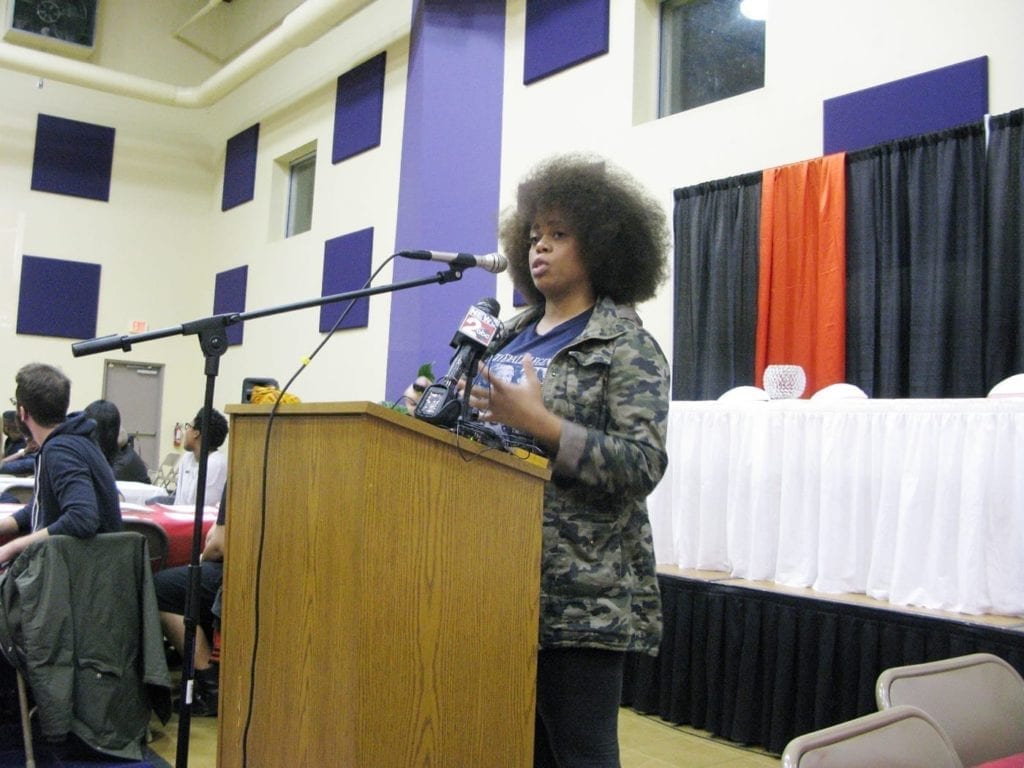By Keena Day
NASHVILLE, TN — Being targeted as a black driver is hotly debated. Angry words are heard. They’ve increased here because Jocques Clemmons was killed running from a traffic stop.
“We are here tonight because of injustice,” Joanie Evans said Feb. 16 while opening a community briefing by Gideon’s Army to discuss its “Driving While Black” study. “We are here tonight to end business as usual.”
Some 44 years ago, the Nashville Branch of the NAACP persuaded officials to exhume a police shooting victim and proved he was shot in the back. Now, Dr. Charles Kimbrough, president of the branch from 1973-1980, says that as Nashvillians “continue to climb the ladder of justice,” the NAACP, Gideon’s Army and others must engage the community and police department in communication.
In the wake of Clemmons’ death, people at vigils, an NAACP press conference, protests at Metro Council and community briefings have heard residents demand answers from police and the mayor. The NAACP set a meeting on this in East Nashville Feb. 23.
“Given the over-policing that black community members endure, and the fear and anxiety that traffic stops induce for many black drivers,” the Gideon’s Army website says, “it is little surprise that Clemmons sought to avoid interacting with the officer at any cost. For trying to preserve his own life, Clemmons lost it.”
Officer Joshua Lippert is on a routine administrative assignment as a result of the shooting. The police report on the shooting states Clemmons had a gun and was a convicted felon. Lippert’s personnel file states he was disciplined twice for excessive force and served an eight-day suspension after he “displayed poor judgement in using physical force to extract a black motorist from his vehicle on a traffic stop.” The Tennessee Bureau of Investigation has been investigating Clemmons’ death. Various Nashville organizations are increasing community efforts to prevent such deaths.
“Driving while black constitutes a unique series of risks, vulnerabilities, and dangers at the hands of MNPD that white drivers do not experience in the same way,” Gideon’s Army states.
Late last year, the group released 12 findings in its report “Driving While Black: A Report on Racial Profiling in Metro Nashville Police Department Traffic Stops.” It states black drivers are up to five times more likely than white drivers to be stopped multiple times a year, and that 80 percent of all MNPD traffic stops in 2015 resulted in a warning.
Those findings apparently ring true with black residents.
“I feel [police] profile me because I am black and drive an Impala in the middle of the night,” says Stanley Cook, an independent contractor who delivers newspapers in Nashville. “In the last month, I have been pulled over 10 times with no citations. I’ve gotten so used to being pulled over that I have myself prepared with my driver’s license and other paperwork. It’s frustrating.”
Gideon’s Army Founder Rasheedat Ferguson says the report is to help reform policing and prompt residents to demand that racial profiling stop.
“These events allow real people to share their stories,” Ferguson said. Dismissal of the statistics and the stories of the people must stop.
Gideon’s Army wants a community review board with subpoena powers, community based restorative justice training, and dialogue among the department and community.
Kimbrough was instrumental in two police brutality cases in 1973 involving two young black men, Cedric Overton and Ronald Joyce.
Overton was standing by a friend’s car and was shot and killed by police. “A story came up that he had a gun. Came back that was not true and that police had planted a weapon or some item that could be used against the victim,” Kimbrough said. The officer admitted wrongdoing, pleaded guilty to involuntary manslaughter, served 10 days in jail, and paid a $10 fine.
Joyce was mistaken as a burglar coming from an abandoned house and was shot in the back of the head by police. He’d run. Police shot him, citing the The Fleeing Felon law. Joyce had no weapon and participated in no burglary. The NAACP had to have Joyce’s body exhumed to prove police lied about where he was shot.
In Clemmons’ case, Kimbrough sees Police Chief Anderson as wanting an open investigation. Kimbrough wants an end to “people in different parts of the system who tell false stories and get away with it…
“We appreciate the police and the department,” he continued, “but police are not the judge and the jury. They are peace officers.
“We hate to see a situation that involves a family and the police department in this way. Clemmons’ family is suffering through this loss of life. Running a stop sign shouldn’t result in death.”
Kimbrough said as Nashvillians “continue to climb the ladder of justice,” the NAACP, Gideon’s Army and other such groups must engage the community and police department in communication.
“Let’s talk. Start having communication with police on several levels. We need a more humane way to communicate. Police have tag numbers, licenses, and without communication our behavior will not change. If you are ordered… there are things we have to lawfully do. Be in compliance. We must be obedient and respectful for orders as long as they are obviously lawful. Communicate with officers and be in compliance. In order to lift levels of what we want to be, we just have to communicate on both sides to get to the next level. Help each other.”


